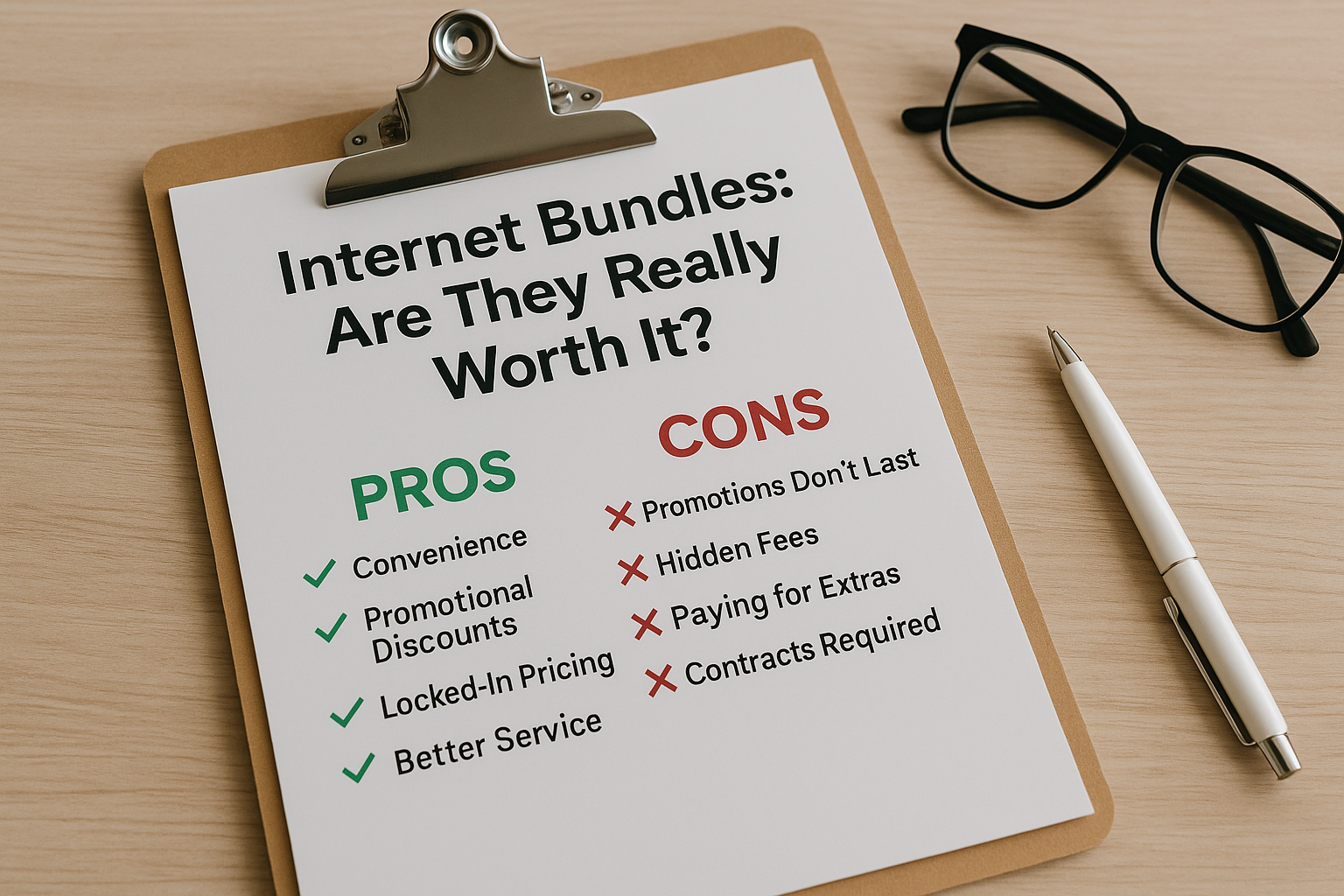Internet providers love to offer bundles. From combining your internet with TV, phone, and even streaming services, they promise convenience, simplicity—and of course, savings.
But are these bundles truly a good deal, or are they just a clever way to make you spend more?
In this article, we’ll break down how internet bundles work, when they’re worth considering, and the red flags you need to watch out for.
Whether you’re shopping for a new plan or reviewing your current one, this guide will help you make an informed decision—and save money in the process.
What Is an Internet Bundle?
An internet bundle is a package deal that includes two or more services from the same provider, typically at a discounted rate.
Common bundles include:
- Internet + TV
- Internet + Landline
- Internet + Mobile
- Internet + Streaming Services
- Triple Play (Internet, TV, and Phone)
Bundles are promoted as “all-in-one” solutions that simplify billing, provide bonus features, and save money. But the actual value depends on how those services are priced—and how much you really use them.
Types of Bundles and What They Include
1. Internet + Cable TV
This is the most common bundle, especially among legacy providers like Comcast, Spectrum, or Cox.
They may include:
- Access to hundreds of channels (many you won’t watch)
- DVR or on-demand services
- Premium channels (HBO, Showtime) for free for a few months
- A discounted overall monthly price
However, these packages often include hidden fees, such as:
- Regional sports fees
- Broadcast TV surcharges
- Equipment rental costs (for boxes or DVR)
If you’re a cord-cutter who mostly streams, this bundle likely isn’t worth it.
2. Internet + Home Phone
Landlines aren’t dead yet—especially in rural areas or for those who prefer a backup phone line.
This bundle may include:
- Unlimited local and long-distance calling
- Voicemail, caller ID, call forwarding
- Emergency 911 support tied to your physical address
But if you never use a landline, this is a service you’re paying for without benefit. And in many cases, the phone component adds $10–$20 per month to your bill.
3. Internet + Mobile
Some ISPs now offer mobile phone service, either via MVNO (mobile virtual network operators) or by partnering with cellular carriers.
You might see:
- Shared data plans with your internet
- Discounts on monthly mobile bills
- Unlimited data options with priority service
This can be a good deal if the mobile service is reliable in your area and replaces your existing cell plan.
4. Internet + Streaming Services
A newer trend involves bundling internet with subscriptions to:
- Netflix
- Disney+
- HBO Max
- Peacock
- Apple TV+
This is especially appealing if you already use these platforms. But beware: after the promotional period ends (usually 3–6 months), you may start getting billed for the full price.
Also, you’re locked into that provider’s version of the subscription—making it harder to cancel or switch platforms later.
5. Internet + Security or Smart Home Services
Some companies offer home monitoring systems, antivirus software, or smart home hubs as part of an internet bundle.
While convenient, this can add $20–$50+ per month—and these services often come with contracts or installation fees.
If you’re tech-savvy, it’s usually cheaper to buy these services or products independently.
Pros of Bundling Internet Services
Let’s be fair—bundles do have legitimate benefits in certain cases.
✅ 1. Convenience
- One bill, one provider, one point of contact
- Easier to manage and troubleshoot issues
✅ 2. Promotional Discounts
- Often cheaper in the first 6–12 months
- Providers waive installation or activation fees
- Limited-time offers like gift cards, free trials, or device upgrades
✅ 3. Locked-In Pricing
- Some bundles offer price guarantees for 12–24 months
- Helps you avoid rate increases in the short term
✅ 4. Bundling Can Unlock Better Service
- Some providers reserve faster internet speeds or exclusive packages for bundle customers
Cons of Internet Bundles
However, these benefits come with trade-offs—many of which cost you more in the long run.
❌ 1. Promotions Don’t Last
After the promotional period ends, prices often rise by $20–$40/month. Many users don’t notice until it’s too late.
❌ 2. Hidden Fees
Cable boxes, streaming access, activation, and taxes often aren’t included in the advertised bundle price.
❌ 3. You Might Be Paying for Services You Don’t Use
If you only watch streaming content, why pay for 100+ cable channels?
❌ 4. Contracts and Early Termination Fees
Bundles often require 1–2 year commitments. Canceling early can result in termination fees of $100 or more.
❌ 5. Bundles Can Make Switching Harder
Being locked into multiple services makes switching internet providers or canceling TV more complicated.
How to Decide if a Bundle Is Worth It
Ask yourself these key questions before committing:
- Do I actually use all the services in this bundle?
- What is the total cost after promo pricing ends?
- How much do each of these services cost if I buy them individually?
- Am I locked into a contract—and for how long?
- Are there better a la carte options available (e.g., streaming, VoIP)?
- How easy is it to remove a service if I no longer want it?
If the bundle only makes sense because of the promotion, it may not be worth it long term.
How to Evaluate Your Current Bundle
Already bundled? Here’s how to review:
- Check your latest bill – Break down each line item
- List the services you actually use
- Look up individual costs – See what internet-only and streaming separately would cost
- Call your provider – Ask if they offer lower-cost internet-only plans
- Use competitor comparison tools – You might find better standalone internet deals elsewhere
If you realize you’re not using the extras, canceling them could save you $30–$70 every month.
Better Alternatives to Bundling
Sometimes it’s better to build your own “bundle” using a mix of independent services:
- Internet-only plan + streaming: Choose 1–2 platforms you actually use
- VoIP phone service: Cheaper than landlines, works over internet
- Mobile + internet discounts: Providers like T-Mobile and Verizon offer home internet discounts for existing mobile customers
- Smart home DIY setups: Use Alexa, Google Home, or Ring devices without ISP contracts
This à la carte approach gives you more flexibility and makes it easier to cancel or switch providers.
Final Thoughts: Don’t Let Bundles Bundle Up Your Wallet
Internet bundles can seem like a good idea, but unless you truly use each included service, they often end up costing more than they save.
Before signing up—or renewing—evaluate what you actually need. In many cases, going with an internet-only plan and adding the services you want separately gives you the same experience at a lower cost.
Shop smart, compare plans, and remember: the best bundle is the one that fits your lifestyle, not just the provider’s sales quota.

With over two decades of experience in the tech world, the author of Promoção InternetFibra is passionate about helping people improve their home internet. He specializes in networks, equipment, and performance optimization, turning complex tech topics into simple, practical advice. His mission is to make reliable, high-speed internet accessible for everyone.
